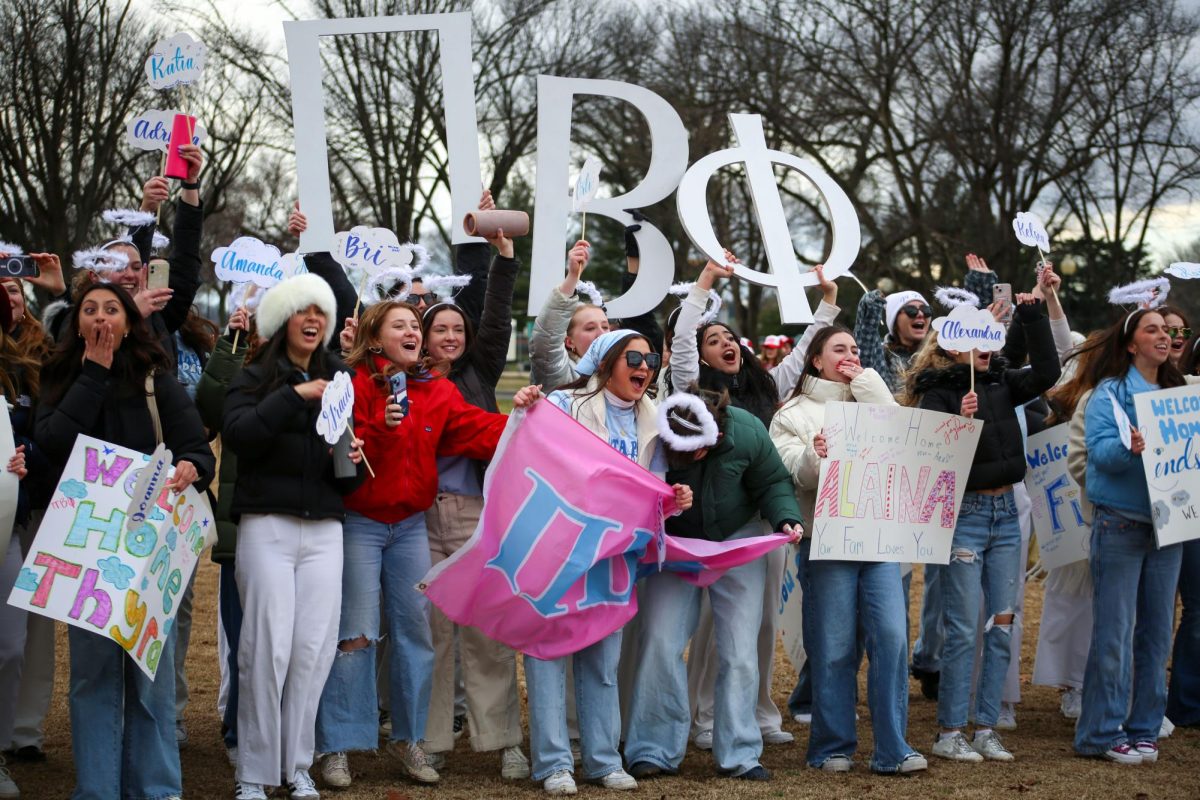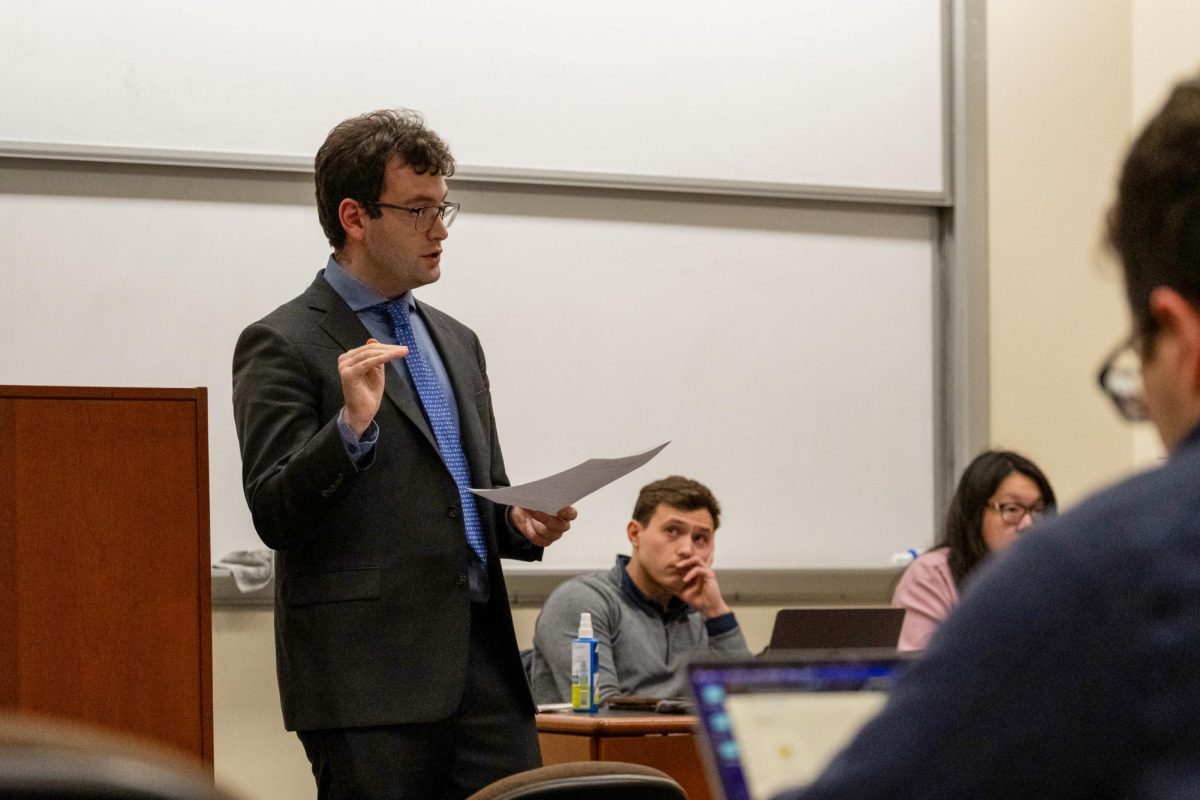The Office of Fraternity and Sorority Life formed a student-led group this semester to boost engagement among chapter members and promote Greek life to nonaffiliated students.
The new Greek Program Board will help produce and promote “hallmark” FSL events — like Meet the Greeks and Greek Week — with current student involvement staff, according to an email sent to community members in July. Director of Student Involvement Meredith Bielaska said the program board will allow members to connect through programming “curated and facilitated” by their peers.
“All members within the community are invited to join GPB so it is an open opportunity for everyone to ensure that their perspectives and desires are represented, addressed, and worked on,” Bielaska said in an email.
Bielaska said the program board was an initiative that students pushed for after they attended the Association of Fraternal Leadership and Values Central conference, a four-day event with programming for all Greek organizations held annually during the start of the spring semester in Indiana.
“After students had the opportunity to attend the Association of Fraternal Leadership and Values in 2024, they came back inspired to put on more engaging and interactive programs for FSL members,” Bielaska said in an email.
Bielaska said the program board is an “open-access volunteer opportunity” with no limits on the number of students that can serve or when members can join. She said the office has promoted the board in FSL community newsletters, on their Instagram page and to chapter and council leaders during meetings. E’Quince Smith, FSL’s area coordinator, is the program board’s adviser and Andrea Davis, the assistant director of student involvement, provide additional support, she said.
Chapter leaders said cross-council communication in the past has limited because of members’ lack of engagement.
Junior Grace Munn, the vice president of recruitment for the Panhellenic Association, said she attended the conference last spring, which representatives from each of the four councils participated in. She said representatives related to each other’s struggles, like how to engage members in their organizations and realized how similar their passions were for Greek life.
“We’re all in it for the same reason, which is awesome,” Munn said.
Munn said the council representatives discussed wanting more collaboration with other councils, but they did not create the idea of having a program board, which may have been inspired by officials after the conference.
“Over the summer, they were brainstorming a little bit of how to keep that connectedness between the councils, and I think that’s how the program board was born,” Munn said. “I don’t recall really saying ‘we are going to do a program board.’”
Munn said FSL often struggles to make council leaders aware of each other and what’s happening in each council. She said council disconnect naturally occurs when members are active in their chapter and council because they commit more time to fostering community within their affiliated organizations instead of cross-council bonding.
“Cross-council collaboration is difficult because people are kind of wary about what they don’t know, and they see another council and they’re like, ‘That’s unfamiliar, therefore it’s scary,’” Munn said.
Every year, FSL hosts programming for students in Greek life, like Meet the Greeks, a social hosted at the beginning of the fall semester where potential new members can meet all the social Greek fraternities and sororities. FSL also hosts Greek Week, a week of programming and “intentional relationship-building” across the four councils, and Greek Awards, a FSL community-wide celebration to honor each chapter’s accomplishments, according to the FSL programming website.
Munn said low turnout at events may be a long-term issue for the program board because FSL-wide events can feel like “forced family fun” as members often do not go unless it’s mandatory. She said a more targeted recruitment strategy would encourage students to apply, including nominating students and encouraging new members to participate as they usually are more eager to get involved in Greek life.
“It’s also so incredibly awkward to stand in a room of people that you vaguely know or that you follow on Instagram,” Munn said. “Waiting for someone to make the first move, or you just want to do something else with your time.”
Junior Henry Lau, the Interfraternity Council president, said Greek life at GW isn’t as “big” as other schools, which allows the entire Greek community to be “very tight-knit.” Lau said the new program board might make events more appealing to members and garner higher turnout by utilizing feedback about the events from their peers.
“If we can get feedback on programming, it makes it so much easier to plan out programming, like for future events,” Lau said.
Junior Alexis Bello, the vice president of the Kappa Chi Chapter of Kappa Alpha Psi Fraternity, Inc., said there are not a lot of multicouncil events, and the new program board will help “bridge the gap.”
Bello said he has not heard much about the new program board from FSL, but he said it would “pop the bubble” each organization is “trapped in” and foster cross-council collaboration on programming. He said he hopes the new program board would plan more events where members can bond with others outside their council, like the FSL dodgeball tournament, an annual event during GW Palooza.
“Even a fundraiser for charity or a food drive would be nice to see all organizations participate in,” Bello said.
Junior Charles Fendig, the president of Delta Tau Delta, said the new program board is a “positive sign” that FSL is making an effort to include student input when creating programming. He said Greek life at GW has been most successful when FSL promotes collaborative efforts with student-facing staff despite broader “flaws” within the office.
Earlier this month, leaders of some IFC chapters said the council was disorganized in booking campus spaces and scheduling events for potential new members during its fall recruitment which thwarted some chapters’ ability to add new members.
“This semester in particular has brought much change to the IFC, however the staff have made an effort to ease us into this transition and maximize the potential benefit of such changes,” Fendig said in an email. “Although I am not attuned to the specifics of the new board, I’m confident it is one of many recent steps FSL is taking to make Greek Life at GW a more inclusive, collaborative, and safer space.”
Junior Alex Berger, the vice president of PHA and external affairs for Sigma Delta Tau, said students within her chapter talked about the new program board when it was first announced over the summer, but she has not had many more conversations about it this semester.
Berger said the establishment of the program board will allow students to have a say in what is being planned but worries students would spend time planning an event that garners low turnout. She said historically, members of the FSL community have been unmotivated to attend most Office of Student Life-sponsored events for FSL unless the event was mandatory.
Berger attributed the lack of community-wide attendance at OSL programs to events conflicting with chapter-specific events or students not thinking the program will be enjoyable.
Berger added that the program board is a good idea because it exists at other schools, like the University of Alabama and Ohio State University.
“It’s definitely hard, but I definitely think it’s a really good idea because it works at other schools and builds community,” said Berger.
Jennifer Igbonoba contributed reporting.





